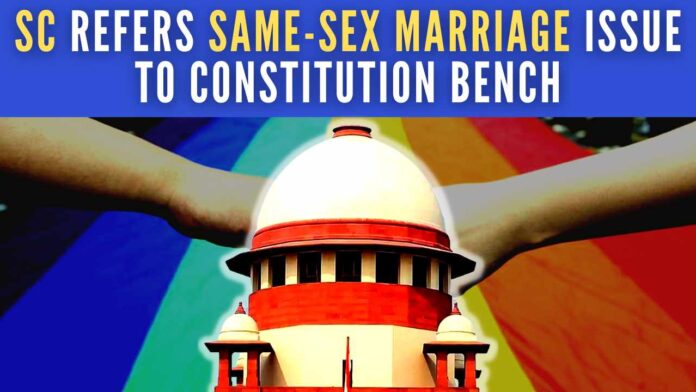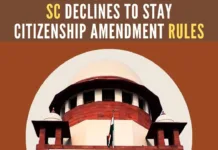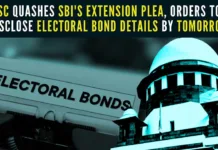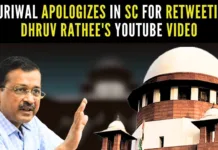
Terming the issue as ‘very seminal’, SC refers pleas for same-sex marriage to a constitutional bench
The Supreme Court on Monday referred the pleas seeking legal validation of same-sex marriages to a five-judge constitution bench for adjudication, saying it is a “very seminal issue”. The Constitution Bench is expected to hear the case on April 18. A bench headed by Chief Justice D Y Chandrachud said the submissions on the issue involve an interplay between constitutional rights on the one hand and special legislative enactments, including the Special Marriage Act, on the other.
The Central government has opposed the petitions seeking legal validation of same-sex marriages, claiming they will cause “complete havoc” with the delicate balance of personal laws and accepted societal values. The bench, also comprising Justices P S Narasimha and J B Pardiwala, said this matter is important enough to be decided by a constitution bench of five judges.
“Having due regard to the broader context of the petitions before this court, the inter-relationship between the statutory regime and constitutional rights, we are of the considered view that it would be appropriate if the issues raised are resolved by a constitution bench of five judges of this court…,” the bench said while referring to Article 145 (3) of the Constitution while terming it a “very seminal issue”.
“We accordingly direct that the hearing of these petitions be placed before a constitution bench,” the apex court said while posting the pleas for hearing on April 18. Article 145(3) of the Indian Constitution says there should be at least five judges to hear cases that involve ” a substantial question of law as to the interpretation” of the Constitution, or any reference under Article 143, which deals with the power of the President of India to consult the Supreme Court of India.
Emphasizing that the question of granting legal sanction to a relationship is essentially a function of the legislature, the Centre said the issue may have an impact on statues like the one for adoption if recognition is granted to same-sex marriage. “The adopted child of a lesbian couple or of a gay couple does not have to be necessarily a lesbian or a gay,” the bench told Solicitor General Tushar Mehta, who was representing the Central government
The court said in the batch of pleas, the petitioners have sought recognition of the rights of couples of the same gender to marry, and while relying upon the apex court verdicts on right to privacy and decriminalizing Section 377 of the Indian Penal Code, they have asserted broader constitutional entitlements arising out of the right to life and personal liberty, right to dignity and others.
The bench said one of the issues raised before it also relates to the rights of transgender couples to marry. When one of the advocates urged the court that the proceedings in the matter be live-streamed, the bench said hearings before the constitution benches are already live-streamed. Mehta told the bench that marriage is not just a contract in the case of Hindu law which is in Mohammedan law.
“When the question of granting recognition, legal sanction to a relationship is concerned, that is essentially a function of the legislature and for more than one reason,” he said. Giving an example, Mehta said the moment marriage as a recognized institution between two persons of the same sex is accepted, the question of adoption comes.
“The parliament will have to examine because the parliament will reflect the will of the people. Parliament will have to examine what could be the position of the psychology of a child who has seen either two men as parents or two women as parents…,” he said. Solicitor General also urged the bench that arguments in the matter should not be cut-short as the judgment on it will affect society as a whole.
In an affidavit filed before the apex court, the government has opposed the petitions and submitted that despite the decriminalization of Section 377 of the Indian Penal Code, the petitioners cannot claim a fundamental right for same-sex marriage to be recognized under the laws of the country. At the same time, it submitted that though the Centre limits its recognition to heterosexual relationships, there may be other forms of marriages or unions or personal understandings of relationships between individuals in a society and these “are not unlawful“.
The Government of India in an affidavit said western decisions sans any basis in Indian constitutional law jurisprudence cannot be imported in this context while asserting that granting recognition to human relations is a legislative function and can never be a subject of judicial adjudication.
PGurus is now on Telegram. Click here to join our channel and stay updated with all the latest news and views
For all the latest updates, download PGurus App.
- Subramanian Swamy approaches Supreme Court on Govt’s modification of 2G Scam Judgment to avoid auction of Satellite Spectrum - April 23, 2024
- Defence Minister Rajnath Singh visits Siachen. Reviews military preparedness - April 22, 2024
- Amit Shah’s shares in the Stock Market almost doubled in the past five years - April 21, 2024











Gay unions or partners should not have right to adopt children for the grown up children will have a tough time in the world when they grow up into adulthood.
It is also possible that such grown up adults will also inherit same sex marriage tendencies & social fabric will be spoilt
time of citizens of India to unite & gherao the Supreme Court.